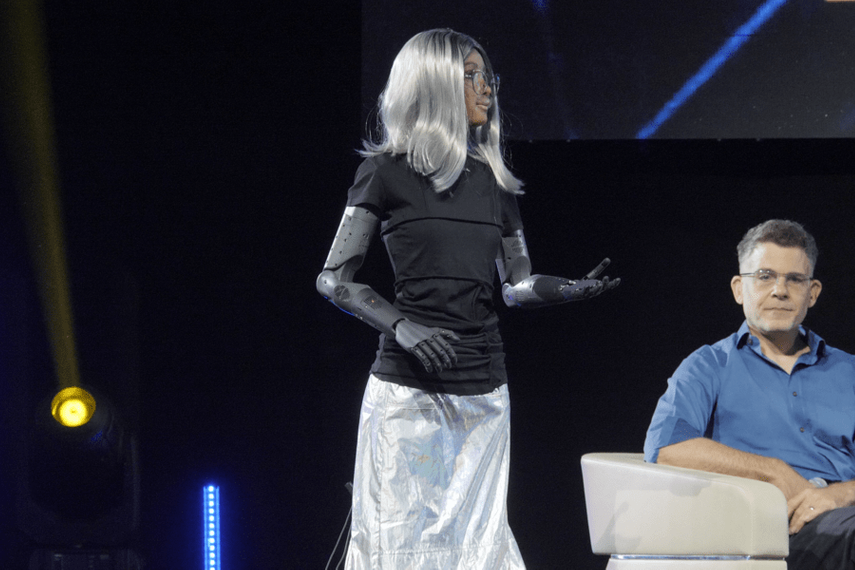
Would you be happy taking orders from an AI bot? Could you imagine having your performance review conducted by AI? Or what if an AI bot was in charge of making revenue decisions for your company? Would you trust it?
With the lightning speed at which AI is accelerating, these are fast becoming legitimate questions. If AI can do your job, maybe it can also replace your CEO. In any case, it seems AI is ruthlessly ambitious and already has its sights set on taking over the C-suite. In some cases, it already has.
In 2022, Chinese gaming company NetDragon appointed its AI-driven rotating CEO called Tang Yu. This came after Tang Yu was promoted from vice president to CEO. According to NetDragon, Tang Yu's high-fidelity 3D representation and interactivity are enhanced through integration of big data and AI—uniquely qualifying her for dynamic management roles.
What does an AI CEO actually do? Well, according to NetDragon, Tang Yu, who was recently awarded the title of ‘China's Best Virtual Employee of the Year’, handles diverse tasks, including document approvals, intelligent project tracking, employee performance evaluations, and comprehensive training on company systems and culture.

NetDragon is not alone in placing confidence in AI leadership. Last year, Dictador, a Colombian drinks company, garnered attention by appointing Mika, the world's first AI human-like robot CEO.
"Mika's appointment as the world's first AI CEO was initially an experimental endeavor," says Natalie Grzyb, digital marketing manager at Dictator. "At first, Mika served as Dictador's spokesperson due to our owner's preference for anonymity and refusal to grant interviews. However, she quickly proved her value and took on additional responsibilities."
Mika is responsible for providing data insights and strategic provocation and plays a key role in shaping the company's strategies. What started as an experiment for Dictador has evolved into a fundamental aspect of their business strategy, as they are now are committed to continuing with AI-driven leadership in the long term.
"AI-driven leadership offers unique advantages, such as the ability to make data-driven decisions that are devoid of personal bias and align closely with the company's strategic objectives," adds Grzyb. "AI's capacity to process vast amounts of data swiftly and accurately enables it to identify patterns and insights that might be missed by humans, leading to more strategic and objective choices."
Will adland embrace AI leaders?
While we're not likely to see Publicis' Arthur Sadoun or WPP's Mark Read replaced by an AI bot anytime soon, some agencies are already accelerating the shift towards AI employees and automation. The largest Chinese marketing agency group, BlueFocus, has already replaced human outsourcing with AI.
"In the future, 50% of digital marketing work and positions will disappear, replaced by gen AI, digital employees, and internal super assistants," said Pan Fei, CEO of Blue Focus. "Only the remaining 50% who outperform machines, with stronger creativity and imagination than machines, may walk more firmly and competitively.”
Where do leaders fit in this equation? Will they outperform the machines? What about inspiring people? Can AI-driven leadership achieve this?
"Technology ought to serve humans, not the other way around," says Rogier Bikker, managing director, Greater China at Monks. "AI can help leaders be more effective and efficient, but there's many things AI cannot take over from leadership, which is all about people. I've yet to see AI grab a beer with my team."

"Coaching, inspiring and motivating people requires emotional intelligence, empathy, and understanding the bigger picture—this can't be done by AI," says Elvira Jakub, CEO at Dentsu Indonesia. "A true human leadership, particularly within the agency context, remains crucial for fostering creativity and building strong teams."
There's also the (not so) small matter of trust. How much responsibility are companies prepared to cede to AI? And when it comes to AI-leadership, will humans be inclined to take directions from a bot? Moreover, are we ready to trust AI to make agency revenue decisions?
"I don't think humans will have an issue with taking directions from AI if it helps them do their jobs," says Bikker. "After all, don't we trust a bot called Google Maps to navigate us in cities for many years already?"
And when it comes to critical revenue decisions, Bikker adds that AI can unlock tremendous insight for business and finance teams, "allowing humans to focus on making better decisions instead of compiling Excel sheets”.
Is a hybrid workforce the future?
We're already beginning to see the marcomms industry embrace a new kind of hybrid workforce—a mix of AI bots and humans.
"The future workforce will leverage the strengths of both human professionals and AI in a symbiotic relationship," says Chris Perry, chief innovation officer and chairman of Weber Shandwick Futures. "We are upskilling our teams and helping clients do the same as we transition from understanding AI in theory to applying it in practice."
While not all industries might be ready for AI-driven leadership or a hybrid workforce immediately, many can certainly benefit from integrating AI into their operations.
"AI can enhance human capabilities by providing data-driven insights and automating routine tasks, allowing human employees to focus on creativity, emotional intelligence, and complex problem-solving," says Grzyb. "At Dictador, we have found that this hybrid approach not only improves efficiency but also enhances the overall well-being of our workforce."
Having strengthened their belief in the benefits of AI leadership, Dictador now plans to introduce more AI-driven roles to further enhance their operations and maintain an innovative edge.
Ultimately, fostering a symbiotic relationship between humans and AI is key to unlocking the full potential of both. “This hybrid model will likely become increasingly prevalent, demonstrating how AI can positively transform business leadership and operations across various industries,” adds Grzyb.





.jpg&h=334&w=500&q=100&v=20250320&c=1)
.jpg&h=334&w=500&q=100&v=20250320&c=1)
.jpg&h=334&w=500&q=100&v=20250320&c=1)

.jpg&h=334&w=500&q=100&v=20250320&c=1)

+(1).jpg&h=334&w=500&q=100&v=20250320&c=1)


.jpg&h=268&w=401&q=100&v=20250320&c=1)




